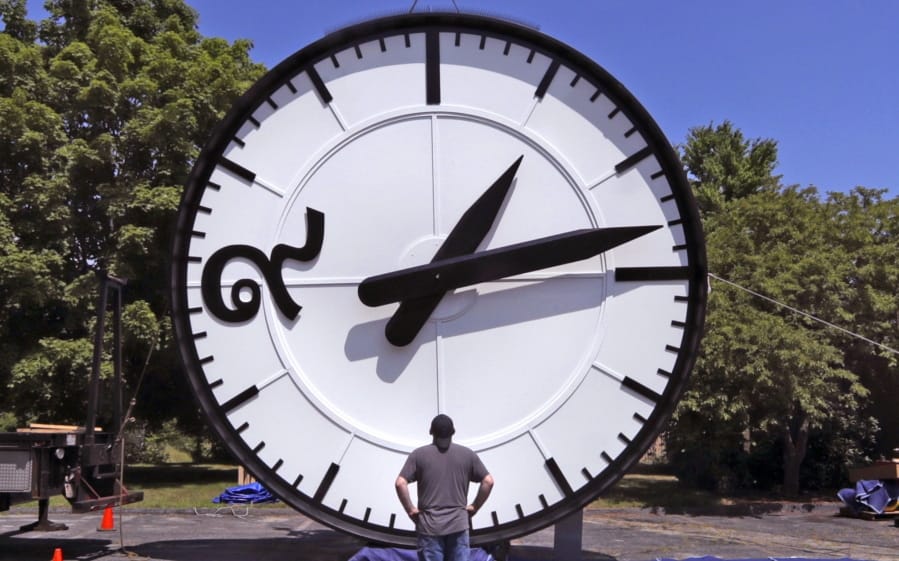SEATTLE — Washington state Rep. Marcus Riccelli isn’t quite ready to give up on the popular bipartisan movement to adopt permanent daylight saving time and do away with the biannual clock switch.
But we still have to set our clock back one hour on Sunday, Nov. 7.
Two years ago, Washington legislators voted to adopt permanent daylight saving time. Similar pieces of legislation were sweeping through the U.S. with 16 other states, including California, Idaho and Oregon passing similar laws, resolutions or voter initiatives. The premiere of British Columbia vowed to join the West Coast if Congress approved the change.
Changes seemed imminent then, but Congress has not acted on the Sunshine Protection Act, sponsored by U.S. Sen. Patty Murray of Washington and Sen. Marco Rubio of Florida, that would amend the Uniform Time Act of 1966 and allow states to adopt permanent daylight saving time. While states can move to permanent standard time without federal approval, congressional action is required to stay on daylight saving time.
Standard time and daylight time
Granted, a lot has happened in the last two years, Riccelli said this week, but that shouldn’t mean the end of the popular proposal.
“People have decided they want this and they are tired of seeing Congress as a broken clock,” he said. “Congress needs wins, things that everybody can get behind and they need to take a stronger look at this.”
A poll by The Associated Press and NORC Center for Public Affairs Research showed that 71 percent of Americans don’t want to keep moving the clock in spring and fall, though they are divided on whether they prefer standard or daylight saving time.
In areas of the country at lower latitude, the difference is not so stark, but it’s keenly felt in the Seattle area. On Seattle’s shortest winter day, the sun rises at about 8 a.m. and sets around 4:20 p.m. If we were to adopt permanent daylight time in the winter, as proposed, the sun would rise at about 9 a.m. and set around 5:20 p.m.
Steve Calandrillo, a professor at the University of Washington School of Law who has testified before legislators and written extensively on the benefits of year-round daylight time, has said that numerous studies show permanent daylight time has distinct advantages.
Proponents of the measure say it would save hundreds of lives each year because darkness in the late afternoon and evening — when most people are awake and moving around — is more dangerous than the dark of morning, when a significant portion of the population is asleep.
It could lead to an estimated 20 percent reduction in crime because, Calandrillo says, it removes one hour from the “preferred workday” of criminals, who like to act in darkness and “are notoriously late risers.”
Among the most common opposition comes from people with concerns about children standing at bus stops in the dark.
However, local experts in depression and sleep science say there are more significant reasons to either embrace the twice-yearly clock change or to adopt permanent standard time instead of daylight saving time.
Both options are more in line with our natural circadian rhythms, which are synced with morning light and are critical for well being, Dr. David Avery, a professor emeritus in the UW School of Medicine’s Department of Psychiatry and an expert in seasonal affective disorder (SAD) has said.
Moving our clocks forward into “daylight time,” essentially losing an hour of morning light and tacking it onto the evening, is devastating for people with seasonal depression, he said.
“I think people are so focused on the idea of having more light in the evening that they don’t think about how this is, in effect, morning light reduction time,” said Avery.
In 2011, Russia rejected the notion of changing the clocks and moved to stay permanently on daylight saving, or summer, time.
The move was determined to be a failure after three years, he said, when studies showed a decrease in academic performance among high-school students and higher rates of winter depression, mortality and cancer.
“I just think this is a massive experiment and that there are going to be some unexpected consequences from this,” he said. “Even night owls will hate it.”
Russian President Dmitry Medvedev, told The Guardian that Russians were fed up with the time changes because they caused “stress and illnesses” and “upset the human biorhythm.”
“It’s irritating, people wake up early and don’t know what to do with themselves for the spare hour,” he said. “And that’s not to mention the unhappy cows and other animals that don’t understand the clocks changing and don’t understand why the milkmaids come to them at a different time.”
The change in Russia was initially popular, but it became widely disliked in a short time and was abolished in 2014 with the lower house of parliament voting 442 to 1 to return to standard time and stay there.
Officials said permanent summer time created stress and health problems, especially for people in northern Russia. They cited medical reports of increased morning road accidents in 2012 compared to previous years, blaming them firmly on the 2011 time change, the BBC reported.
Avery said switching the clock back and forth is not ideal, but it’s the best option among the choices: permanent standard time, permanent daylight time or our current method of springing forward and falling back.
Riccelli said he wants the conversation to begin in Washington state next year and he’s willing to have the conversation include a move to permanent standard time, though he and most of the voters he heard from, prefer daylight saving time.
“Anything we can do to ditch the switch and never go back makes sense.”




